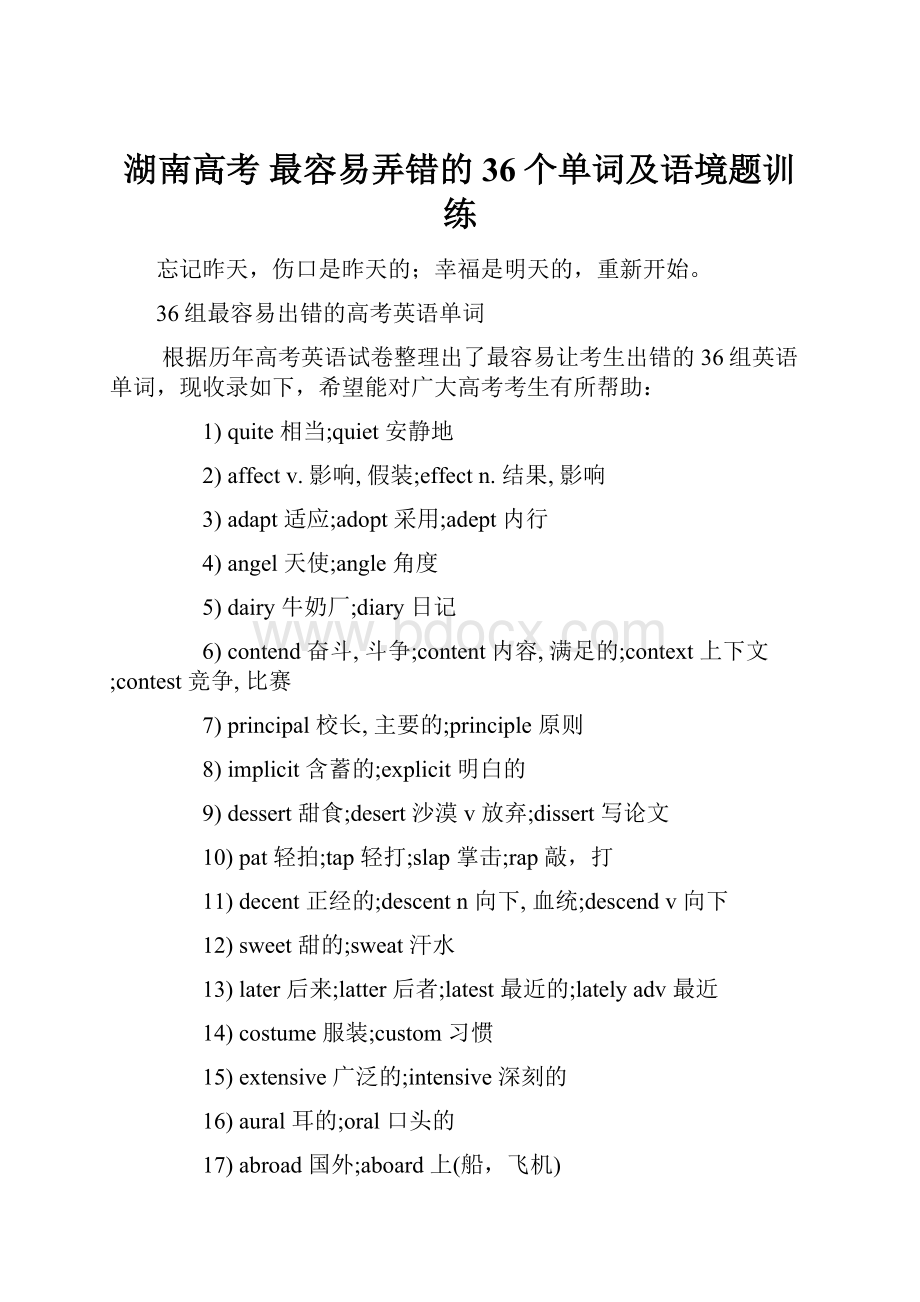湖南高考 最容易弄错的36个单词及语境题训练.docx
《湖南高考 最容易弄错的36个单词及语境题训练.docx》由会员分享,可在线阅读,更多相关《湖南高考 最容易弄错的36个单词及语境题训练.docx(14页珍藏版)》请在冰豆网上搜索。

湖南高考最容易弄错的36个单词及语境题训练
忘记昨天,伤口是昨天的;幸福是明天的,重新开始。
36组最容易出错的高考英语单词
根据历年高考英语试卷整理出了最容易让考生出错的36组英语单词,现收录如下,希望能对广大高考考生有所帮助:
1)quite相当;quiet安静地
2)affectv.影响,假装;effectn.结果,影响
3)adapt适应;adopt采用;adept内行
4)angel天使;angle角度
5)dairy牛奶厂;diary日记
6)contend奋斗,斗争;content内容,满足的;context上下文;contest竞争,比赛
7)principal校长,主要的;principle原则
8)implicit含蓄的;explicit明白的
9)dessert甜食;desert沙漠v放弃;dissert写论文
10)pat轻拍;tap轻打;slap掌击;rap敲,打
11)decent正经的;descentn向下,血统;descendv向下
12)sweet甜的;sweat汗水
13)later后来;latter后者;latest最近的;latelyadv最近
14)costume服装;custom习惯
15)extensive广泛的;intensive深刻的
16)aural耳的;oral口头的
17)abroad国外;aboard上(船,飞机)
18)altar祭坛;alter改变
19)assent同意;ascent上升;accent口
20)champion冠军;champagne香槟酒;campaign战役
21)baron男爵;barren不毛之地的;barn古仓
22)beam梁,光束;bean豆;beenbe的过去式
23)precede领先;proceed进行,继续
24)pray祈祷;prey猎物
25)chicken鸡;kitchen厨房
26)monkey猴子;donkey驴
27)chore家务活;chord和弦;cord细绳
28)cite引用;site场所;sight视觉
29)clash(金属)撞击声;crash碰撞,坠落;crush压
30)compliment赞美;complement附加物
31)confirm确认;conform使顺从
32)contact接触;contract合同;contrast对照
33)council议会;counsel忠告;consul领事
34)crow乌鸦;crown王冠;clown小丑;cow牛
35)dose一剂药;doze打盹
36)drawndraw的过去分词;drown溺水
话题一:
中学生的爱好与兴趣
Sparetime(业余时间),favorite(最喜欢的),Interest(兴趣),hobby(爱好),appetite(嗜好),taste(口味),readnovels(也小说),playfootball/basketball(打足球/篮球),surftheinternet(上网),chatonline(在线聊天),playgames(玩游戏),collectstamps(集邮),makee-friends(交网友),climbmountains(爬山),watchTV(看电视),enjoypopularmusic(喜欢流行音乐),beinterestedin(对…感兴趣),developaninterestin(在…方面发展兴趣),befondof(喜欢…),bekeenon(喜欢…),havelovefor(喜爱…),haveatastein(对…有兴趣)等。
话题二:
劳动与劳动观念
Work(工作),beatwork(在工作),workhard(努力工作),produce(生产),worker(工人),laborforce(劳动力),labor(劳动),voluntarylabor(义务劳动),servethepeople(为人民服务),heartandsoul(全心全意),physicallabor(体力劳动),mentallabor(脑力劳动),laborviewpoint(劳动观念),laborDay(劳动节),workday(工作日),meansoflabor(劳动方式),honorable(光荣的),bedevotedto(奉献于..),value(价值),earnmoney(赚钱),personalinterests(个人利益)等。
话题三:
创建和谐社会
harmonious(和谐的),friendly(友好的),civilized(文明的),honest(真诚的),credible(诚信的),bepublic-spirited(有公德心的),balanced(平衡的),beinorder(有序的),peaceful(和平的),liveinharmony(生活和谐),sustainabledevelopment(可持续发展)等,helpeachether(互助),careforeachother(互相关心),havedeeplovefor(热爱),beconcernedwith(关心),build(创建),cherish(珍惜),takeanactivepartin(积极参与),payattentiontosocialmoral(讲究社会公德),protecttheenvironment(保护环境),saveenergy(节省能源)等。
Nopains,nogains.不劳无获。
…canbeachievedbyhardwork.…可以通过劳动获得。
Itisdifficulttofindworkinthepresentsituation.在当前形势下,很难找到工作。
Itishonorableto……是光荣的。
Ifeveryone…forothersandthesociety,ourworldwillbe…如果每个人为他人和社会做…,我们这个世界将会…。
Everyoneshould…anddevoteshimselftobuildingourmotherlandintoastrongcountry.每个人应该…,为把我们祖国建设成为一个强壮的国家而奉献自己的力量。
话题四:
招聘与求职
employ(雇佣),lookfor(寻找),takein(吸纳),full-time(全职的),part-time(兼职的),well-paid(薪水高的),bepaidbythehour(按小时发工资),requirement(要求),résumé(个人履历),schooling(受教育情况),subjects(课程),workingexperience(工作经历),qualification(合格证明),transcript(成绩单),health(健康状况),presentaddress(现在通讯地址)等,applyfor(申请…),graduatefrom(毕业于),majorin(以…为专业),degree(学位),scholarship(奖学金),goodgrades(良好的成绩),hobby(爱好),favorite(最喜欢的),beskilledin(在…方面熟练),begoodat(擅长…),experienced(有经验的),confident(自信的),Englishandcomputerability(英语和计算机能力),healthy(健康的)等。
话题五:
中学生的健康问题
Physicalandmentalcondition(身体与精神状态),strong(强壮的),un/healthy(不健康/健康的),overweight/fat(肥胖的),thin(瘦的),near/short-sighted(近视的),mentallyunhealthy(精神不健全的),normal(正常的),abnormal(不正常的),energetic(精力旺盛的),unhealthyeatinghabit(不健康的饮食习惯),eatmuchjunkfood(吃太多的垃圾食品)等,Stay/keephealthy/fit(保持健康),buildupone’sbody/improveone’shealth(强身健体),enoughsleep(充足的睡眠),takeregularexercise(进行有规律的运动),roperdiet(合理的饮食),goodlivinghabits(良好的生活习惯),loseweight(减肥),removeheavyburdens(减轻负担),begoodfor/dogoodto(对…有益处),nutrition(营养),goondiet(节食),forma…eatinghabit(养成一个…的饮食习惯)Breatheinasmuchfreshair等。
话题六:
环境保护
Pollute(污染),Wasteisscatteringhereandthere.(到处撒满了废弃物),protecttheenvironment(保护环境),sendoutsmokeandpoisonousgasesintotheair(散发出烟和有毒气体),cutdowntrees(砍伐树木),pourwastewaterintotherivers(把废水注入河流),Itisashametothrowrubbisharound.(乱扔垃圾是可耻的),formgoodhabitstoprotectthesurroundings(养成良好的习惯来保护环境),takeactivemeasurestoprotectrareanimals(采取积极措施保护稀有动物),takegoodcareofourforests(关心我们的森林),plantmoretreestoimprovetheenvironment(多植来改善环境),Theterriblepollutionhavedonegreatharmtousaswellastothesurroundings.(可怕的污染已经给我们自己还有我们的环境带来了很大的危害。
)
话题七:
校园文明与安全问题
Schoolrulesandregulations(学校规章制度),obey(遵守),observe(遵守),keep/observediscipline(遵守纪律),behavewell(表现良好),beneatlydressed(穿戴整洁),respectone’steachersandparents(尊敬师长),beontime(准时),keeptheenvironmentclean(保持环境干净),civilized(文明的)breaktherules(违反规章制度),discipline(纪律),spit(吐痰),throwrubbisheverywhere(乱扔垃圾),cheatintheexam(考试作弊),getinline(插队),fightwithsb.(与…打架),punishsb.for(因…处罚某人)等。
Thestudentsaretoldnottobreakanyoftherulesoftheschool.学校要求学生不要违反任何规章制度。
Thestudentsareexpectedto…学校期望学生…。
Itmustbemadeclearthatthestudentsshould…必须明确的一点是,学生应该…。
…isofnogoodtoafriendlyandharmonioussociety.…对创建友好和谐的社会是毫无益处的。
Itishonorabletoobeytheprinciplesandrulesofourschool.遵守学校的规章制度是光荣的。
Itisworthyofpraiseto...…是值得表扬的。
Itisshamefulto……是可耻的。
Whatweshoulddoisthat…我们应该做的事情是…
话题八:
友谊
gettoknowsb.(认识某人),knowsb.reallywell(熟知某人),makefriendswithsb.(和某人交朋友),astrongpersonality(一个很强?
?
?
个性),personalmatters(隐私),friendship(友谊),friendly(友好的),aclosefriend(一个亲密的朋友),trusteachother(相互信任),precious(珍贵的),worthy(有价值的),understanding(通情达理的),share…withsb.(与…分享…),beloyalto(对…忠诚),keepintouchwithsb.(与…保持联系),keepcompanywithsb.(和…结交),staybestfriendswithsb.(和…保持很好的友谊)等。
在描述此话题时常用的句型有:
1.Friendsgiveus…朋友给予我们…。
2.Agoodfriendissomeoneyoucan…一位好朋友就是一个我们能够…的人。
3.ThefirsttimeImet…,hewas…当我第一次遇到…的时候,他…。
4.Friendshipplaysanimportantpartin…友谊在…中扮演一个重要角色。
5.Youcan…tobeagoodfriend.你可以…来成为别人的好朋友。
6.Wecanturnto...whenwefeeldown.当我们心情糟糕时,可以求助于…。
7.…makesagoodfriend.…成就好朋友。
8.Afriendinneedisafriendindeed.患难见真知。
9....isoneofthethingspeoplevaluemostinafriend.
…是人们在朋友身上最重视的东西。
10.…haveafriendof…yearswithsb.…与…有着…年的友情。
备考高考英语主语从句考点的四个要点
一、弄清主语从句有哪些引导词
可以用于引导主语从句的词语主要有五类:
连词that和whether、连接代词、连接副词、关系代词型what、关系代词型-ever类词——在一个句子中到底该什么样的“引导词”,主要根据句子意思以及句子结构来确定。
如:
1.Thatfashiondiffersfromcountrytocountrymayreflecttheculturaldifferencesfromoneaspect.各个国家不同的时尚潮流从一个方面反映了各国之间的文化差异。
2.Whenthedelayedflightwilltakeoffdependsmuchontheweather.那架延误的班机何时起飞在很大程度上取决于天气。
3.Whatweexpectfromyouisworkinghardratherthanhardlyworking.我们期待你的是努力做事,而不是几乎什么都不做。
【分析】第1句用that引导主语从句,that既不充当句子成分,也没有具体的含义;
第2句用when引导主语从句,when在主语从句中充当时间状语,表示“何时”;
第3句用what引导主语从句,what在主语从句中用作动词expect的宾语,在意思上相当于thethingthat。
二、弄清什么情况下使用形式主语
为避免头重脚轻,人们通常会将主语从句置于句末,而在主语位置处使用形式主语it。
如:
1.Itisbynomeansclearwhatthepresidentcandotoendthestrike.完全不清楚总统要做什么才能结束那场罢工。
2.Itremainstobeseenwhetherthenewlyformedcommittee’spolicycanbeputintopractice.新形成的委员会的政策能否贯彻落实还有待被观察。
3.ItisunbelievablethatMr.Lucasleadsasimplelifedespitehisgreatwealth.尽管卢卡斯先生拥有大量的财富,但是他过着简朴的生活,这真是让人难以置信。
【分析】第1句真正的主语是主语从句whatthepresidentcandotoendthestrike;
第2句真正的主语是主语从句whetherthenewlyformedcommittee’spolicycanbeputintopractice;
第3句真正的主语是主语从句thatMr.Lucasleadsasimplelifedespitehisgreatwealth。
三、正确理解关系代词型what引导的主语从句
what引导主语从句时有两种意思:
一是表示“什么”,此时的what为疑问代词转化来的连接代词;二是表示“……的……”“……所……的”等,相当于allthat,thethingthat,thethingsthat等,我们称此时的what为关系代词型what。
如:
1.Whatwedonextlieswithhim.我们下一步做什么要由他决定。
2.Whatyousaidatthemeetingdescribesabrightfutureforthecompany.你在会上的发言为公司描述了一幅美好的前景。
3.WhatIwanttotellyouisthedeeploveandrespectIhaveformyparents.我想告诉你的是我对我父母的深爱和尊重。
【分析】第1句中的what连接代词,表示“什么”;第2、3句中的what为关系代词型what,在意思上相当于thethingthat。
四、正确理解关系代词型-ever类词引导的主语从句
这里所说的关系代词型-ever类词主要指whatever,whoever,whichever等词,它们引导主语从句时的主语从句的一个明显特点是,在意义上相当于“先行词+关系代词”,即whatever=anythingthat,whoever=anyonewho,whichever=anyonewho/any…that。
如:
1.Whateverisleftovermaybeputintotherefrigerator,whereitwillkeepfortwoorthreeweeks.
剩下的任何东西都可以放入冰箱,在那里可以保存两三周。
2.Whoeverwantstostayinahotelhastopaytheirownway.无论谁想留在旅店都必须自己付账。
3.Whicheveroneofyoubreaksthewindowwillhavetopayforit.你们中不论是谁打坏了玻璃窗都要赔偿。
【分析】第1句中的whatever相当于anythingthat;
第2句中的whoever相当于anyonewho;
第3句中的whichever相当于any…who,即Whicheveroneofyoubreaksthewindow相当于Anyoneofyouwhobreaksthewindow。
【即学即练】阅读下面句子,在括号内填入适合的单词。
1.________shebecameanartistmayhavebeenduetoherfather’sinfluence.
2.________hehasbeenabroadornotdoesn’tmakemuchdifference.
3.________makesthisshopdifferentisthatitoffersmorepersonalservices.
4.________we’lldoistoleaveanoteforMumtotellherwewon’tbebacktilllate.
5.“Whatdoyouwanttodonext?
Wehavehalfanhouruntilthebasketballgame.”“It’suptoyou.________youwanttodoisfinewithme.”
6.Everyoneisequalbeforethelaw,and________breaksthelawshouldbepunished.
7.________playerscoresthehighestnumberofpointswillbethewinner.
8.Itisnoneofyourbusiness________otherpeoplethinkaboutyou.Believeyourself.
9.Itisuncertain________sideeffectthemedicinewillbringabout,althoughabouttwothousandpatientshavetakenit.
10.Itisnotclear________so